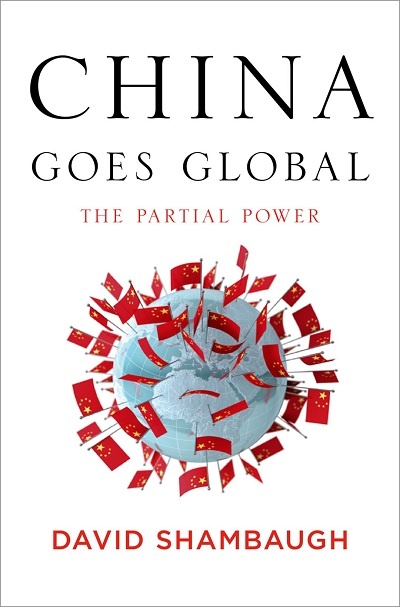
China Goes Global: The Partial Power, by David Shambaugh, OUP USA, £20/$29.95, 320 pages
Reviewed for: Meridiano 47, Vol 15, No 141 (2014).
Download complete pdf here.
Today’s debate about the future of global order is marked by a near-certainty that China’s economy will overtake that of the United States within the next decade. Most analysts also believe that as a consequence, China will be able to challenge and eventually supplant the US as the global hegemon. We are heading, the story goes, towards a ‘Chinese world’.
David Shambaugh, Director of the China Program at George Washington University, disagrees. He argues that China “has a very long way to go before it becomes – if it ever becomes – a true global power.” According to him, “China will never rule the world.” The reason, according to the author, is not merely economic. The book argues that China lacks close friends or allies, and that China is not normatively integrated into the community of nations. It lacks a military network similar to that of the United States. Furthermore, its reactive foreign policy keep it from taking the initiative, leaving its diplomatic footprint smaller than its economic weight would suggest. Above all, China has no soft power – its cultural products fail to set global trends like that of the United States.
Adopting Joseph Nye’s argument that resources do not constitute power unless they can be used to influence actors or the outcome of a situation, Shambaugh argues that China is a global actor without yet being a global power. Perhaps most provocatively, the author argues that “one does not see Beijing proactively and positively trying to resolve any global problem.”
This points to an interesting debate about how to define power in international relations. Is cultural influence a necessary ingredient to be a global power? Would it not be natural that Chinese culture would be met with skepticism in a world strongly influenced by Western cultural norms?
In addition, Shambaugh’s overall argument seems to assume that China’s economic rise does not increase its capacity to influence others. Yes, China has only a limited number of leading multinational corporations and is only the world’s fifth-largest overseas investor, yet this will inevitably change in the coming decades. China’s soft power is certain to increase as its economy becomes more powerful. Conscious of this, the government in Beijing is financing a growing number of Confucius Institutes around the world. The number of university students studying Mandarin across the world will dramatically increase, leading to a greater comprehension of Chinese society and culture.
I therefore tend to disagree with Shambaugh’s suggestion that the hype about China’s rise is unwarranted. China clearly faces enormous challenges, unlike the United States a century ago. China’s way to the top will thus be far more difficult and less predictable. And yet, paradoxically, China Goes Global provides simply too many statistics in favor of China’s dominance to agree that it is only a partial power.
Irrespective of such questions, Shambaugh’s book is extremely well written and researched, providing the reader relatively balanced and comprehensive overview of China’s role in the world and about the internal debate in China – a debate which remains opaque and little understood.
Read also:
Book review: “Samudra Mathan: Sino-Indian Rivalry in the Indo-Pacific” by C. Raja Mohan
Should the world try to democratize China?
Book review: “The Boxer Rebellion and the Great Game in China” by David J. Silbey








